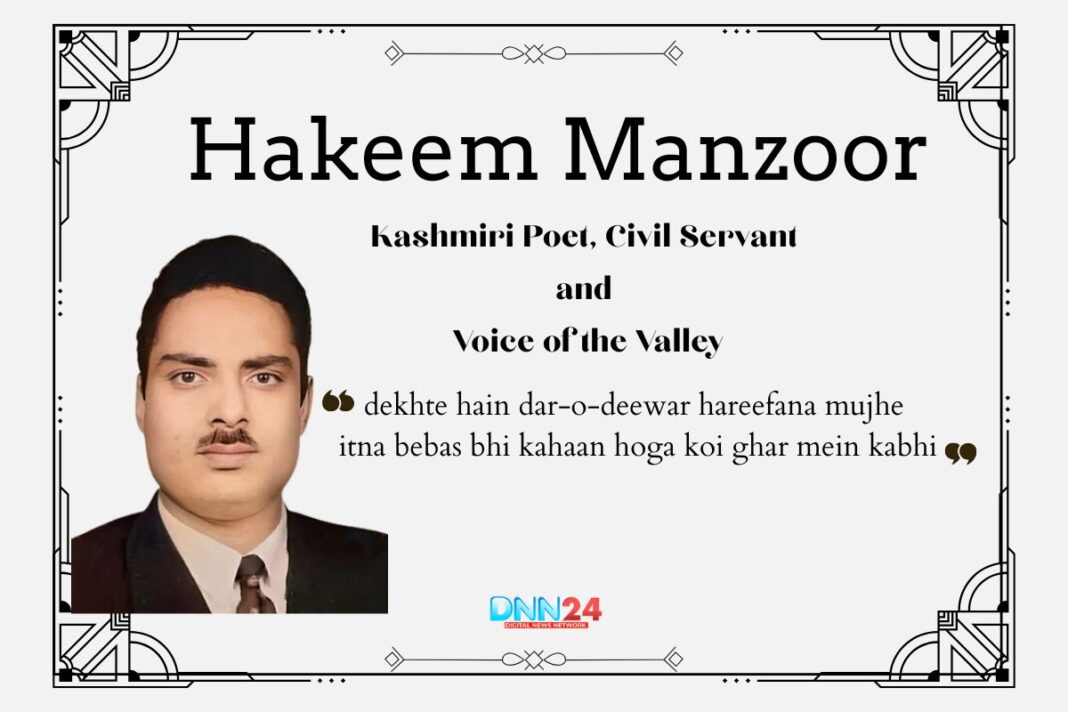Hakeem Manzoor came into the world on January 17, 1937, when Srinagar was covered in thick snow. His childhood home was different from most others. Books lined the walls, and visitors would spend hours talking about poetry, faith, and the meaning of life. His mother, Sidiqa Begum, believed that education could change everything.
shahr ke aain mein ye mad bhi likhi jaegi
Hakeem Manzoor
zinda rahna hai to qatil ki sifarish chahiye
She would sit with young Manzoor on cold nights and tell him stories about famous poets who had changed the world with their words. One winter was harsh. The family had to gather around a small coal fire to stay warm. Manzoor remembered those nights for the rest of his life. He later wrote that those moments taught him more about kindness and human connection than any classroom ever could.
har ek aankh ko kuchh toote khwab de ke gaya
Hakeem Manzoor
wo zindagi ko ye kaisa azaab de ke gaya
At Islamia High School, teachers noticed something different about this quiet boy. Money was always tight in the family. Manzoor could not buy proper notebooks for his poems. Instead, he wrote his verses on the edges of old newspapers. His teacher, Maulvi Nooruddin Sahib, found these scraps of paper. He read them to the entire class. For the first time, Manzoor felt what it meant to be heard. Those early days of struggle planted seeds that would grow into something beautiful.
hum kisi bahrupiye ko jaan len mushkil nahin
Hakeem Manzoor
us ko kya pehchaaniye jis ka koi chehra na ho
Finding His Voice: The Journey from Student to Poet
After finishing school, Manzoor went to S.P. College in Srinagar, then moved to Aligarh Muslim University. His family wanted him to study science. That was what all the smart boys from Kashmir were supposed to do. But Manzoor’s heart pulled him in a different direction. He loved words and stories and how poetry captured feelings that regular speech could not. Choosing literature for his Master’s degree was not easy. People around him had doubts.
giregi kal bhi yahi dhoop aur yahi shabnam
Hakeem Manzoor
is aasman se nahin aur kuchh utarne ka
Some thought he was throwing away a promising future. But Manzoor stayed firm in his decision. By 1955, he had already been publishing poems in college magazines. Soon, bigger journals started printing his work. The 1950s and 1960s brought many changes to Urdu poetry. New styles were becoming popular. Many writers were trying to sound modern and intellectual. Manzoor took a different path. His poems stayed connected to Kashmir.
mujh mein the jitne aib wo mere qalam ne likh diye
Hakeem Manzoor
mujh mein tha jitna husn wo mere hunar mein gum hua
He wrote about the things he saw around him and his emotions deeply. Some people made fun of his simple style at one early poetry gathering. They thought his verses were too plain, too easy to understand. Years passed. Those same lines that people had mocked became famous across the state. They were quoted at critical literary events. People praised them for being honest and real. Manzoor had proved that staying true to yourself was more important than following trends.
baagh mein hona hi shayad seb ki pehchaan thi
Hakeem Manzoor
ab ki wo bazaar mein hai ab to bikna hai use
Working for the People: A Government Officer with Heart
While building his reputation as a poet, Manzoor also joined government service. He worked at JKAS and held many important positions. He served as Custodian of Evacuees Property, Secretary of Jammu Development Authority, Director of School Education, and Deputy Commissioner of Baramulla. Government work in those days was complete with paperwork and slow processes. Many officers just did what they were told. Manzoor was different.
itna badal gaya hoon ki pehchaan le mujhe
Hakeem Manzoor
aaega wo to khud se guzar kar hi aaega
He saw his job as a way to help ordinary people. His colleagues remember many stories about his kindness. Once, he was asked to approve the demolition of a building. Doing so would have left dozens of low-income families without homes. Manzoor refused to sign the order. This decision could have brought him trouble. Instead of just saying no, he worked hard to find temporary shelters for those families. Later, he wrote about their struggles in his prose. He had a habit of visiting schools without warning anyone.
teri aankhon mein aansu bhi dekhe hain
Hakeem Manzoor
tere haathon mein dekha hai khanjar bhi
He would carry a notebook and write down what teachers and students told him about their problems. Sometimes, after finishing official meetings, he would recite poetry. His verses spoke about the sadness and hope that filled Kashmir. People loved him because he was not just a government officer. He was someone who genuinely cared. His work showed that you could be both efficient and compassionate simultaneously.
apni nazar se toot kar apni nazar mein gum hua
Hakeem Manzoor
wo bada ba-shuoor tha apne hi ghar mein gum hua
Words That Never Die: His Poetry and Lasting Influence
Hakeem Manzoor’s writing became the heartbeat of Kashmir. His poems and stories captured what people felt but could not say. Works like ‘Na Tamaam’, ‘Barf Ruton Ki Aag’, and ‘Lahu Lamas Chinar’ are still read and loved today. Critics admired how he brought together old poetic traditions with modern concerns. He used beautiful images from classical poetry but wrote about Kashmir’s real problems.
agarchhe us ki har ik baat khurduri hai bahut
Hakeem Manzoor
mujhe pasand hai dhang us ke baat karne ka
After retiring from government service, Manzoor started something new. He founded a newspaper called ‘Khabar-o-Nazar’. It was printed in three languages. For 11 years, this newspaper spoke for people with no other voice. It talked about Kashmiri identity, language, and rights.Manzoor’s pen became his most potent weapon. He used it to fight for justice and dignity. Many people do not know about his evening activities.
jo mere paas tha sab loot le gaya koi
Hakeem Manzoor
kivaad band rakhoon ab mujhe hai dar kis ka
He would organise writing workshops for children who had lost their parents. He published poems by new writers without charging them anything. These acts of kindness were never announced publicly. They live on only in the memories of those who received his help. Manzoor passed away in 2006.
tujh pe khul jaayenge khud apne bhi asrar kai
Hakeem Manzoor
tu zara mujh ko bhi rakh apne barabar mein kabhi
His grave in Srinagar still receives visitors. Students come seeking inspiration. Poets come to pay respect. Ordinary people come to remember a man who showed them that greatness means serving others. His life proves that dreams and duty can walk together, and that one person can make a difference through words, actions, and silent acts of love.
Also Read: Deep Narayan Nayak: Teacher of the Street Who Turned Walls into Blackboards
You can connect with DNN24 on Facebook, Twitter, and Instagram and subscribe to our YouTube channel.



